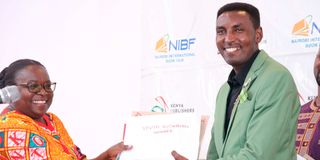Winners celebrate return of annual literary awards

Shullam Nzioka (right) winner of the Kiswahili youth category, with his book Mbona Hivi? receives his award from Joan Mwachi, regional director, World Reader East Africa.
What you need to know:
- For two consecutive years (2020 and 2021) authors had not been recognised due to the Covid-19 pandemic.
- In the only Wahome Mutahi entry, the winner was Samuel Wachira, a Catholic priest, who ministers in Meru and wrote the book Hustler’s Chains.
- In the main Jomo Kenyatta Prize for Literature, Marx Kahende, a retired diplomat emerged the winner, in the English Adult category, with his book The Wayward Vagabond, published by East African Educational Publishers (EAEP).
It was bound to be a literary harvest with a difference, in a number of ways.
For one, publishers, who organise the Jomo Kenyatta and Wahome Mutahi literary awards, were still shaking off the debilitating effects of the Covid-19 pandemic that saw their operations almost grind to a halt.
This meant that for two consecutive years (2020 and 2021) authors had not been recognised, since literary awards are given during the Nairobi International Book Fair (NIBF), which could not be convened for those two years.
There was also the fact that the previous sponsor for the awards pulled out and Kenya Publishers Association (KPA) had to look for a new sponsor to fill the void.
Eventually, it was decided that the two awards had to be merged to make it the Jomo Kenyatta/Wahome Mutahi Literary Prize, although the Wahome Mutahi bit had a single entry.
The third and most important aspect of the awards was the fact that they ushered in new and interesting characters into the winners’ roll.
The list of winners had a priest, a retired diplomat, two journalists, a translator and a writer’s son. Quite a healthy mix.
In the only Wahome Mutahi entry, the winner was Samuel Wachira, a Catholic priest, who ministers in Meru and wrote the book Hustler’s Chains.
It was just as well for he opened the whole with a word of prayer.
Election pawns
The book is a humorous take on how poor people are used as pawns during elections when politicians are seeking power and self-preservation.
Sounds familiar, right? Hustlers’ Chains is published by One Planet Publishers.
Wachira is not a newcomer to writing, though, his other book, A Spider’s Web is currently a set book for diploma teacher training colleges.

Marx Kahende (left), who won in the Adult English category, with his book The Wayward Vagabond, with his publisher Kiarie Kamau.
He was shortlisted for the awards in 2017 and 2019 but fell short both times.
“Although I was disappointed, my editor told me that one does not write to win awards; you write to tell people something,” said Wachira, adding that he is the only priest in the country to have written a book on popular culture and the only priest to have won an award.
In the main Jomo Kenyatta Prize for Literature, Marx Kahende, a retired diplomat emerged the winner, in the English Adult category, with his book The Wayward Vagabond, published by East African Educational Publishers (EAEP).
“The Wayward Vagabond exposes historical fallacies and the greed by Western powers for our human and natural resources, from the days of slavery to colonialism and by extension, to the present day,” explains Kahende.
He nursed the writing dream from an early age and “made a pledge to myself that one day I would publish a novel to give back to the wonderful world of literature. It remained an enduring commitment. I had a dream, the drive but not the time. Upon retiring from the diplomatic service, I seized the opportunity to put the plan into action, and The Wayward Vagabond was born,” adds Kahende.
In the Kiswahili category, Kwenzi Gizani (published by Marimba Publications), a play by Kiswahili scholar Kithaka wa Mberia, emerged the winner.
Two of Kithaka’s earlier plays, Kifo Kisimani and Maua Kwenye Jua la Asubuhi, have been set books in Kenyan schools.
The win left him elated and was a confirmation that the success of his earlier works, which have been studied up to Masters level, was on merit.
“Though I publish my own works, they go through the whole publishing process. I give my manuscripts to professional readers and I abide by all their recommendations,” he explains. “A number of them have been rejected and I must effect the required changes before publishing them.”
Coastal writers
Winners in the children’s category (Kiswahili and English), share similarities: they are not only journalists, they both hail from Kenya’s coast.
Sarah Haluwa, a columnist in The Nairobian, won in the English category with her book, Chadi’s Trip (Storymoja), while Ali Attas, a radio journalist/producer, based in Japan, won in the Kiswahili category with his book Fumbo la Watamu, published by One Planet.
While Haluwa comes from Kilifi, Attas hails from Mombasa. Both were submitting their books for judging for the first time and both won on the first attempt.
Haluwa has two other children’s books to her name, all published by Storymoja.
“To be honest with you, I never expected to be the winner, since my fellow nominees were more experienced,” said Haluwa, who grew up reading compositions her teacher mother was marking for her pupils.
“The win is a validation for my writing; it will encourage me to write more.”
Attas, who has written 14 Kiswahili short stories, explains that each one is a model of how to craft a good story using as many literary skills as there are available.
“For instance, Fumbo la Watamu begins with the crowing of the cock when dawn breaks and ends when the family goes to bed and a daughter who asked her father a question about the saga he had told them after dinner, responding with a final answer, ‘Fumbo la Watamu’,” he adds.
He recently achieved a major milestone by translating Paulo Coelho’s The Alchemist into Kiswahili – Mualkemia, published by Moran.
In the English youth category, a writing dynasty was entrenched when Ngugi wa Thiong’o’s son Nducu, won with his book Benji’s Big Win, published by EAEP.
Nducu, who is based in the US, dedicated his win to his late mother, Nyambura wa Ngugi.
“I must also extend a note of warmth to my father Ngugi wa Thiong’o, and all my brothers and sisters, for their unconditional support.”
“A big note of thanks to my wife Grace Gathungu for her love and support, and to our daughter Nyambura wa Nducu who, on taking her to bed asks; “Wi mwandiki?” (Are you a writer?) This means that I must rack my brains for a new and captivating episode of Benji and his love interest Abele, to sustain her ever-increasing curiosity,” adds Nducu.
Shullam Nzioka is a translator cum businessman. His book Mbona Hivi? published by Oxford University Press, won in the Kiswahili youth category.
“My joy is indescribable,” says Nzioka. “I never expected to win, as the competition was quite stiff. The other two nominees, Shisia Wasilwa (Makovu ya Uhai) and Mathias Momanyi (Taabu za Tabu) are established journalists.”
Nzioka says that with the win, he is now encouraged to write more. “I can confidently say that merit is recognised. This should invigorate young writers to know that they can be recognised in the future as long as they write well,” he added.
Kiarie Kamau, the chairman of (KPA) said that the two literary awards demonstrate that Kenyan Publishing has come of age.
“We are increasingly becoming a force to reckon with in the area of publishing in Africa and beyond,” said Kamau, who is also the managing director of EAEP.
“We sit on the Executive Committees of the International Publishers Association as well as the African Publishers Network.
We publish high-quality and a wide range of general reading materials, most of which serve a global audience. We are already visible in the digital publishing and online selling space,” he added.
The awards were sponsored by Madison Insurance. Each winner, including the runners-up, received a kindle from World Reader East Africa.




